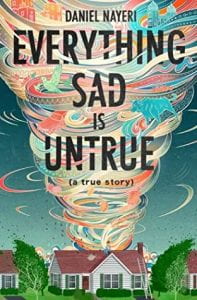 Nayeri, Daniel. Everything Sad Is Untrue (A True Story). Levine Querido, 2020. 346 p. 978-1-646-14000-8. $17.99. Grades 7-12.
Nayeri, Daniel. Everything Sad Is Untrue (A True Story). Levine Querido, 2020. 346 p. 978-1-646-14000-8. $17.99. Grades 7-12.
When Khosrou’s (Daniel’s) physician mother converts to Christianity in the 1980’s, she endangers her life because of the Iranian government’s restrictions on religion. His father, a jovial, loquacious dentist covertly obtains the proper paperwork for escape, then drops off his eight-year-old son and twelve-year-old daughter, Dina, at the airport as his wife starts a journey that will take the threesome to Dubai, Italy, and finally, Oklahoma. Daniel Nayeri’s Printz Award-winning book, Everything Sad Is Untrue (A True Story), telling how his family turned from comfortable, wealthy land owners to battered, poor refugees can be summed up in these few sentences; but the flow of the chapter-less pages weaves a tale likened to the much admired, Scheherazade of 1,001 Nights. The paragraphs describing memories of Daniel’s (no one in America can pronounce Khosrou!) grandparents’ home and his parents’ relationship spin into beloved Persian legends and myths and wind up next to pages relating the harsher daily existence he experiences in Oklahoma. Daniel is at the center of a maelstrom as the cover depicts, a twelve-year-old boy with different tastes in foods and specific hygienic customs, wanting to fit in yet also wanting to hold on to the Persian culture he cherishes. A son with vivid recollections who longs for the warmth of his biological father, but is resigned to live with his stern, abusive Farsi- speaking step-father whom his mother marries and keeps remarrying for companionship and convenience, despite the beatings she suffers. As Daniel narrates his life tale with casual familiarity, the reader learns of the ancient heritage of Iran and its reverence and love of story, his difficulties adjusting to each stage of the refugee journey, and his impressions of Americans and life here. Most of all, the story is a tribute to the perseverance and unconditional love of his mother, Sima. In the refugee hotel of Italy instead of lolling around all day waiting for the call to emigrate, she makes a connection with a Texan woman living in Rome who home schools her own children and arranges for Daniel and Dina to share in the lessons even though Sima has to spend hours erasing the answers from the host children’s cast-off notebooks so that Daniel and Dina can use them. Her determination and dignity to make life good for her son and daughter are evident in that scene. Told not as a memoir, but as a work of fiction—for as the narrator tells us, it is not so simple to sort out fact from fiction when dealing with one’s memories—Daniel delivers the truth of his life as he remembers it with humor and charm and not a bit of self-pity. Shifting from present to far past to recent past, he shares his varied observations, thus preserving his precious legacy of storytelling, made up or real, or a mixture of both.
Realistic Fiction Bernadette Cooke, School District of Philadelphia
THOUGHTS: Like the coveted cream puffs described in one of Nayeri’s tales, this book is a treat for those who appreciate a different writing style and matchless imagery. There are bits of scatological references—the unhappy affect of a first-time encounter with Sloppy Joes and negotiating a toilet with a bidet—but the targeted audience may appreciate and even empathize with Daniel’s situations. Written with a truly inimitable voice, this work is unlike any book for middle grade or young adult this reader has encountered. Recommend to students who love words or like to write, to those new to a place, or those needing to understand another perspective.
